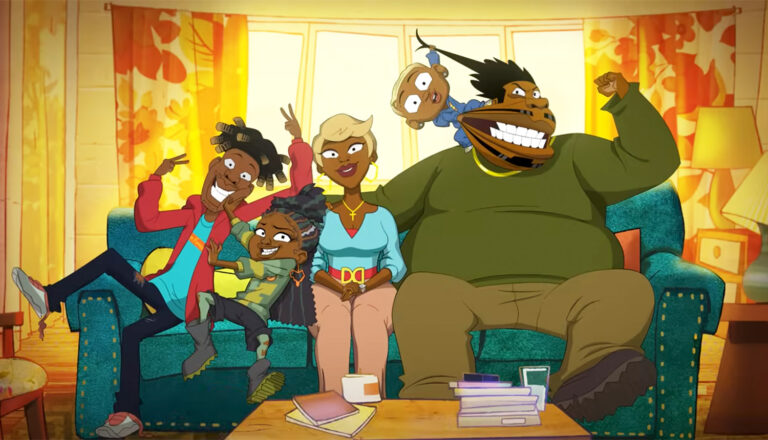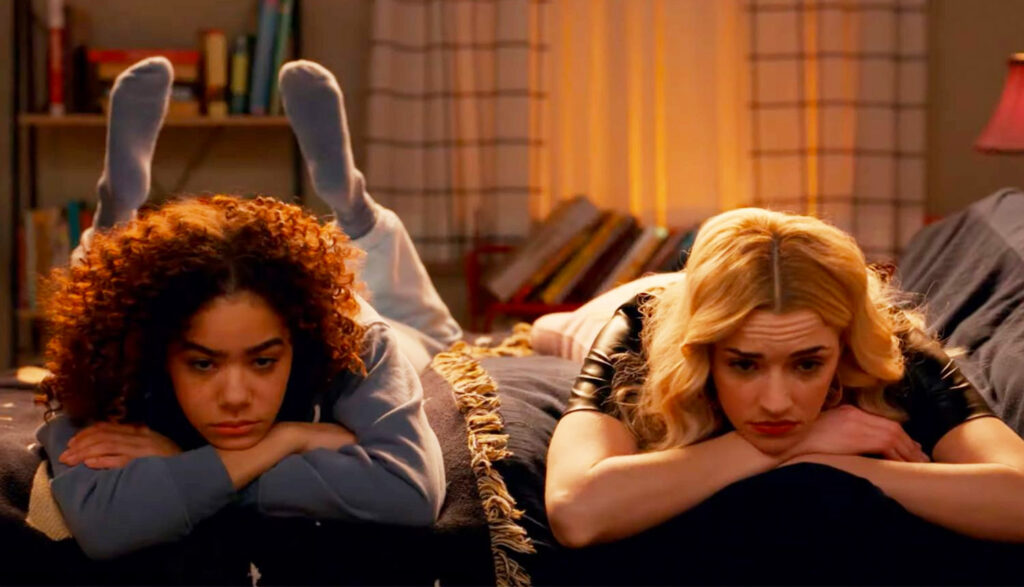
Good Times
Netflix takes a classic sitcom, Good Times, and turns it into a vulgar, violent, sexually-charged TV-MA show.

Georgia Miller has a killer smile. Fitting, that.
It’s not that Georgia kills or hurts or maims people all that often. Hardly ever, really. But Georgia’s been on her own since she was 15 and pregnant, and she’s seen that the world can be a hard, dangerous place. Like a truck-stop mentor once told her: The world is full of bees; it’s best to sting first.
Georgia took the advice and thrived—smiling at and charming and, when necessary, kneecapping each challenge as it comes. She’s moved around a lot in this great big country, slept around a lot in great big beds, and she’s improved her lot at each step of the way. She has two kids: teenage Virginia, who was born in Virginia; and 9-year-old Austin, who was born in Austin.
But the curious little family’s in Massachusetts now, and Georgia says she’s done with men, even if her red lipstick and plunging neckline beg to differ.
Virginia knows her mom’s promises aren’t worth much. Still, the teen (who prefers to go by “Ginny”) hopes that she keeps her word this time. After all, it’d be weird to have a sibling named Massachusetts. And let’s be honest: She’s got her own problems to deal with.
Ginny doesn’t know about her mother’s deep, dark past, or just how far her mom’s willing to go to protect her and Austin. She just knows that having Georgia for a mom can be really frustrating.
Oh, Ginny loves her mother. But it’s not easy to be the daughter of someone that all the high school guys ogle. Or to get “The Talk” at age 7, which presented sex as a sweaty business transaction. “You should never give anything unless you’re getting something in return,” Ginny recalls her mother telling her, at an age not too far removed from training wheels and Velcro shoes.
Ginny’s 16 now—a year older than her mom was when she had her—and she’s trying to decide who and what she wants to be apart from Georgia’s cynical advice. She’d never had a boyfriend ’til they arrived in Massachusetts; now her love life’s more complicated than her AP English exams.
And she’s beginning to wonder … just who is her mom? What is she hiding in her bedroom closet? What secrets is she keeping locked away? Is Georgia even her mother’s real name?
As Season 2 begins, Ginny’s struggling to cope with how much those secrets are eating her up inside. She suspects that Georgia did indeed kill her last husband, and Ginny may have even helped cover up the evidence. But private investigator Gabriel Cordova is on to Georgia—or he thinks he is—and he’s been pressuring Ginny to give up what she knows.
So Ginny’s run away (taking Austin with her) to spend some time with her dad, Zion. But nightmares about her mom killing her have led to panic attacks and even self-injury. At one point, she tells her on-again, off-again boyfriend Marcus, “My whole family’s broken. I’m broken.”
She’s not wrong, as Ginny & Georgia’s deep relational dysfunction inches toward something like Euphoria, albeit nowhere near as graphic.
“We’re like the Gilmore Girls, but with bigger boobs!” Georgia tells Ginny in Season 1. And indeed, many have compared Ginny & Georgia to that beloved WB/CW show. But those comparisons have not been particularly flattering.
Gilmore Girls had its issues, of course, but it was built on snappy dialogue and winsome characters. Ginny & Georgia is built on soap and sass and salacious content and scads of inappropriate behavior.
Ginny laments in the opening episode that she’s still a virgin at age 15. She loses said virginity in that same opening episode. Georgia plays the “cool mom” as she plots and schemes and cheats and connives her way into the town’s inner workings and the mayor’s heart—drinking lots of wine and smoking lots of weed and flashing lots of cleavage along the way. Oh, and let’s not forget she’s willing to break noses, arms and even whole people if they threaten her little family arrangement. Because Georgia’s a bee, remember, and she has a brutal sting.
Gilmore Girls? More like girls gone wild.
I’m sure that as the show trundles on, it’ll offer some nice thoughts on familial love and acceptance and, who knows, maybe even responsibility. But all those messages feel a little like Georgia’s lipstick—a glossy sheen to hide the machinations underneath. Ginny & Georgia is, at best, trashy escapism not fit for the teens it’s aimed at. At worst, it’s just plain trash.
As Season 2 begins, Ginny has stolen ex-boyfriend Marcus’ motorcycle and run away from home, taking little brother, Austin, with her. They’ve spent a couple of weeks with Ginny’s biological father, Zion Miller, who’s doing his dead-level best to be a good dad. Meanwhile, Georgia and Paul are engaged and preparing for marriage, but it’s clear that Georgia’s many secrets may yet spoil the party. As Thanksgiving approaches, all of the show’s characters are navigating tense relationships with extended family.
Ginny, for her part, seems convinced that her mother is a murderer. Flashbacks to Season 1 show her being interrogated by private investigator Gabriel Cordova (whom we see on his computer in the present, chatting with, apparently, his gay partner in their home). Ginny is terrified of her mom and has a nightmare about her mom trying to suffocate her with a pillow. But she doesn’t want to tell anyone or turn her mom in, and she’s coping with that dissonance by self-harming. We see her with a lighter apparently burning her abdomen as she counts to four. (She eventually confesses this behavior to her dad in vague terms, apologizes, and says that she wants to stop.) We also see her researching the flower known as wolfsbane, which she learns can cause someone to have a heart attack. Georgia’s own flashbacks and panic attacks recall at least one man who wanted to kill her.
Various Thanksgiving celebrations among several different families feature, alternately, a prayer of thanksgiving and a lot of drinking. Paul’s mom gushes that’s what Thanksgiving is for. Marcus, meanwhile, smokes a joint and opines to his mother, “I’m not in a very thankful mood. We celebrate a holiday that praises our success at genocide. It’s a white celebration of colonization. If that’s not sadistic enough, then we package it up with image of a happy, smiling turkey.” Elsewhere, Ginny is reading the book The Parable of the Sower, by Octavia Butler, which she tells her mom is about “the demise of America through capitalist fascism.” Georgia says sarcastically and angrily to Ginny, “God in His infinite wisdom put me in charge of your wellbeing, Virginia.”
Marcus sneaks in the window to see Ginny near the end of the episode. She tells him to go at first, but then invites him to spend the night with her. They kiss, then lie down together, with Ginny still in torment over what her mom may have done. In a separate scene, Georgia pulls her top off (we see her bra), then puts another shirt on in front of Paul. We also see the two of them getting ready for bed in their bedroom (and it’s clear that they’re cohabitating though they’re not yet married).
We hear at least seven s-words, about 10 misuses of God’s name and one or two uses each of “d–n,” “b–ch,” “a–,” “a–hole,” “crap” and “good Lord.”
After Georgia’s latest husband dies of a heart attack/car crash, she pulls up stakes and moves her little family all the way to a small, affluent town in Massachusetts. She promises her kids, Ginny and Austin, that she’s going to concentrate on them while they’re here—not seek out a new, eligible bachelor. “Mama’s dating life is like [the] desert—nothing as far as the eye can see,” she says. But the next day, it seems Georgia’s already plotting a way to get close to Paul, the town’s mayor and most eligible bachelor. Meanwhile, Ginny—who laments at the beginning of the episode that she’s still a virgin at 15—sleeps with her best friend’s brother and goes on her first real date with a totally different guy. We see a handful of flashbacks to Georgia’s own murky past.
The sex scene between Ginny and her neighbor (who are, remember, both well underage) is fairly explicit. We don’t see anything critical, but we do see Ginny’s bare back and the two having sex underneath the covers. And we hear some very graphic dialogue about what they’re doing under said covers.
Ginny also recalls a graphic sex talk that her mother gave her when she was 7 years old. In the car, Georgia and her 9-year-old son, Austin, sing to an extraordinarily provocative song. When Ginny wonders aloud whether it’s appropriate for Austin, Georgia muses that he probably doesn’t know what it means: The ensuing conversation suggests he knows exactly what it means. We hear references to sex, porn, various body parts and condoms. We also learn that Georgia uses a particular sex toy.
Georgia dresses provocatively throughout the episode, including at her husband’s funeral. (Other attendees remark on the inappropriate levels of cleavage she’s showing.) When her credit card bounces at a clothing store, she picks up a pair of the store’s shoes, tells an unwitting cashier that she’s returning them and asks for in-store credit to “buy” the purse she wants.
Austin’s new classmates are bullying him and, after the first day of school, break his glasses. When she sees the 9-year-old culprit, Georgia leads the boy and Austin behind some bushes, tells Austin to punch the kid in the nose, then squeezes the bloodied (and perhaps broken) nose with a tissue, pretending to staunch the bleeding as they all exit the hiding place. (Georgia tells the boy’s mom that he fell after threatening the kid to not tell the truth.) She also blackmails a restaurant owner.
In a flashback, a 15-year-old Georgia fights with a man (perhaps her father), scrambling out of a trailer as the guy threatens to kill her. She leaves with a big black eye. She later finds herself in a bar and drinks beer with a 17-year-old (with a fake ID), and later the two ride off into the world on his motorcycle.
Marcus—the next-door neighbor Ginny slept with—also smokes marijuana. His mom grounds him for the habit (which he ignores) takes a baggie of it from his sister’s room and later gives it to Georgia, who smokes it that night. Later, Marcus’s mom comes by and suggests to Georgia that they smoke the marijuana that she just confiscated from her son. (They do.) Georgia drinks lots of wine throughout the episode, too. Marcus’ twin sister, Maxine, is a lesbian: She makes a handful of references to her sexual preferences, and her mom says that Maxine came out when she was 9 (because, apparently, she was fascinated by her Barbie doll’s breasts). Characters say the s-word about 10 times. We also hear “a–,” “b–ch,” “b–tard,” “crap,” “d–n,” “h—” and “p—y.”
[Spoiler Warning] In flashback, Georgia’s new husband makes some deeply inappropriate physical moves on his teen stepdaughter under the guise of helping her with her yoga. Georgia sees, and she apparently poisons his coffee. The guy suffers a heart attack while driving and crashes his car, the combination of which kills him.


After serving as an associate editor at NavPress’ Discipleship Journal and consulting editor for Current Thoughts and Trends, Adam now oversees the editing and publishing of Plugged In’s reviews as the site’s director. He and his wife, Jennifer, have three children. In their free time, the Holzes enjoy playing games, a variety of musical instruments, swimming and … watching movies.

Paul Asay has been part of the Plugged In staff since 2007, watching and reviewing roughly 15 quintillion movies and television shows. He’s written for a number of other publications, too, including Time, The Washington Post and Christianity Today. The author of several books, Paul loves to find spirituality in unexpected places, including popular entertainment, and he loves all things superhero. His vices include James Bond films, Mountain Dew and terrible B-grade movies. He’s married, has two children and a neurotic dog, runs marathons on occasion and hopes to someday own his own tuxedo. Feel free to follow him on Twitter @AsayPaul.

Netflix takes a classic sitcom, Good Times, and turns it into a vulgar, violent, sexually-charged TV-MA show.

While its protagonist might live a nuanced life, The Sympathizer’s problematic content can’t be described the same way.

Say hola once again to the iconic explorer in this faithful reboot of the children’s series.

Based on a popular video game, Ark: The Animated Series features hungry dinosaurs, bloodthirsty people and plenty of problems.